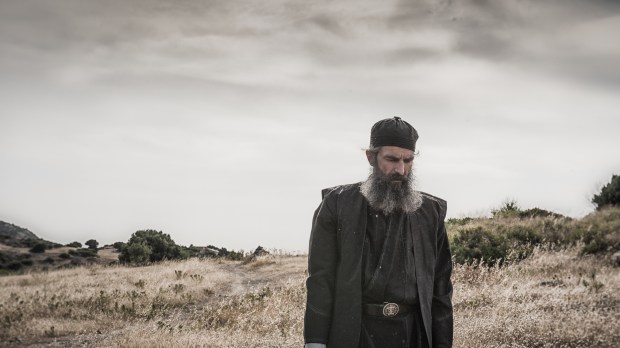Flannery O’Connor once wrote, “It seems to be a fact that you have to suffer as much from the Church as for it but if you believe in the divinity of Christ, you have to cherish the world at the same time that you struggle to endure it.” It is a sad notion, but there have been many saints who were not treated well by the Church in their own lifetimes: St. Martin de Porres, St. Joan of Arc, St. Alphonsus Liguori, and on the list goes. Responding to mistreatment is never easy, but it is especially hard when those who mistreat us are religious leaders. The new film Man of God shows us, though, that there is a way through such treatment that, rather than destroying our faith, ultimately renders us more holy and closer to the heart of Christ.
The film follows the life of Nektarios of Aegina, a saint of the Greek Orthodox Church who lived under nearly constant persecution from his fellow bishops. Though he was beloved by his people, he was exiled, slandered, and at times even had to endure physical assault. Yet he never lost his faith and hope in God. He died in obscurity in 1920 at the age of 74. By 1961, he had been recognized as a saint by the Ecumenical Patriarchate of Constantinople. In 1998, the Greek Orthodox Patriarchate of Alexandria and All Africa issued a formal apology for all that they had made Nektarios suffer through.
Yelena Popovic wrote and directed the film. She shared with Aleteia what inspired her to make this movie and why she believes it will resonate with people of many different backgrounds.
What is your background with the Christian faith?
I was born in Belgrade, Serbia. Even though my parents were baptized in the Serbian Orthodox Church, they were not practicing their faith. They never even spoke of it, so I did not know much about the Christian faith. I clearly remember that I always believed in God, but until later I did not know who Jesus Christ was, or who the Holy Virgin Mary was. I did have faith. Every time I would walk into the church in Belgrade, I felt the presence of the Holy Spirit, I felt it was God’s home. Before I left Belgrade, I went to the church to ask God to protect me. While in Milan, Italy, I would frequently go to the Cathedral in Piazza Duomo to pray. When I lived in New York City, almost every day I went to St. Patrick’s Cathedral. A couple of years later in Los Angeles, I got baptized in the Serbian Orthodox Church, and in 2000 I had my first confession and communion. I experienced a presence of grace that lasted for several hours after partaking of the Eucharist, and ever since I started to attend Mass on a regular basis.
What made you decide that you wanted to make a film about St. Nektarios? What importance does he hold for you personally?
Even though I often read books on saints, I never thought of making a film about a saint. In the summer of 2012, I went to Belgrade for the one-year memorial of my father. It was there that I bought a book about St. Nektarios of Aegina. As I read about him for the first time, I was moved on a very personal level. Almost every word of it sounded as if it was written in my soul. I couldn’t help but think of my father who, like St. Nektarios, was persecuted for righteousness’ sake.
My father was one of the best civil engineers in ex-Yugoslavia, but while loved and respected by common people, he was disliked by his superiors, as he was not willing to do unethical things to further his career. There were those who were set on making profits, regardless of what it took to get rid of him. They brought him to court on false charges, and after six false witnesses testified, he was fired from his position. After a long time, he managed to get a job in a small factory in the suburbs, where he worked until he retired. He was often criticized for being too honest and too righteous at the cost of his own wellbeing and those around him; however, I always admired him for it. The imprint that he left inside of me was rekindled by the story of Saint Nektarios. I simply had to make a film about it. I had to put myself inside of the story to bring St. Nektarios to the hearts of people. I made the film in the hope to help those who suffer the most.
Saints are so filled with the grace of the Holy Spirit that they are not only aware of their own sins, but they start feeling that they are also responsible for the sins of others. They are so engulfed by God’s Love that they become completely selfless and they cannot help but take on burdens for the sake of others.
There are several scenes in the movie that show Nektarios taking on burdens for the sake of others. In one scene, while he was head of the seminary and some students had been fighting, he responds by punishing himself with several days of fasting. Where do you think this approach came from for him? What do you think we can learn from it?
When a person starts getting close to God, they become more and more aware of their own faults. If we are in the room with very little light, we do not see things clearly. As we approach the light, we start seeing things better. In the same way, a person who is walking towards God, towards the light, becomes more and more aware of his own state. Saints are so filled with the grace of the Holy Spirit that they are not only aware of their own sins, but they start feeling that they are also responsible for the sins of others. They are so engulfed by God’s Love that they become completely selfless and they cannot help but take on burdens for the sake of others. St. Nektarios had incredible humility, which nowadays many mistake for weakness. There is no greater strength than to be humble. Only then can we acquire a true peace and true happiness.
St. Nektarios was Eastern Orthodox, but there is much about his story that is similar to many western saints. In what ways do you think he could be a figure who unites Christians of different kinds? Do you think there’s anything Catholics in particular might find appealing about him?
Eastern Orthodox and Catholics venerate many of the same saints. In general, stories of saints are universal. People of different faiths, denominations, and ethnic backgrounds can relate to them. Even people of no faith. One of the main premises of Man of God is that lust for power and money destroys people and humanity. One thing that almost all saints have in common is strong faith, love for God and people, accompanied with persecution and suffering. St. Nektarios was unjustly persecuted his entire life. A lot of people can relate to that. Another thing that Catholics can certainly relate to is St. Nektarios’ love of and devotion to the Holy Virgin Mary.
He is revered as a saint now, but he was treated very badly by the hierarchy of the Orthodox Church during his life. Why was he treated so poorly?
In every Christian denomination and every religion, we have examples of holy people being mistreated because they are holy. Whether it is in the Eastern Orthodox, Catholic, or Protestant Church, we have those who live by what they preach, those who shed the light of Christ, and those who are more interested in money and power than Jesus Christ. St. Nektarios was a true follower of Jesus Christ, for he lived a Christ-like life. Because of that he was able to help people, and people loved him. This aroused jealousy in those who seek glory from men instead of glory from God.
The first public screening of the film was done on Mount Athos in January 2021 in front of 150 monks. I was very pleased and relieved that they liked it.
Have you spoken with any current bishops in the Greek Orthodox Church about the film? Have any of them seen it? If so, what has been their reaction?
Many of the bishops in the Greek Orthodox Church have liked the film and have supported it, for which I am very grateful. Metropolitan Cleopas of Sweden was a consultant on the story. As a matter of fact, the first public screening of the film was done on Mount Athos in January 2021 in front of 150 monks. I was very pleased and relieved that they liked it.
Mickey Rourke is given top billing in the cast and he is heavily advertised as the star of the film, but he only appears in the film for a couple of minutes. How did he come to be associated with the project? And what’s the importance of his character?
Mickey Rourke does play a smaller role but a very meaningful one. As I was trying to make a film for the international audience, I needed an international cast. When I wrote the character of the paralyzed man, I thought of Mickey Rourke. I never forgot his incredible performance in The Pledge, in which he had only one scene but the one you never forgot if you saw it. I was well aware of his incredible talent and his devotion to the Catholic faith, and I felt that he was perfect for the role. When he read the script, he connected with his part, and I’m grateful that he came all the way to Greece to work with me.
What do you hope that people will feel when they watch this film? What’s the big take-away?
I made this film for those who suffer, and after so much feedback from different people of different faiths and nationalities it does seem that the film has a healing quality. After an interview with a French journalist, I received a personal email. It stated something like this — I lost my husband a year ago from cancer. I was devastated. I did not want to live any longer. After seeing your film, I feel I want to go on living.
What other films or film makers influenced you as you were writing and shooting this film?
I did watch a lot of John Huston before making the film. I like his style. I read the book written by Elia Kazan multiple times as I wrote the script and before I started to direct. For me it was all about what does every word of it mean to me and how truthful I can be in every scene. By directing On the Waterfront, Elia Kazan said that the story was so personal to him that he was practically showing the world where he stood.
A bit of an odd hypothetical, but if St. Nektarios were to meet Pope Francis, what do you think he might say to him?
I do not know what he would say to Pope Francis if they were to have met, but I believe that he would listen attentively.



